人教版英语八年级下册试题since 和 for 的用法(用于现在完成时)
人教版英语八年级下册unit10知识点总结
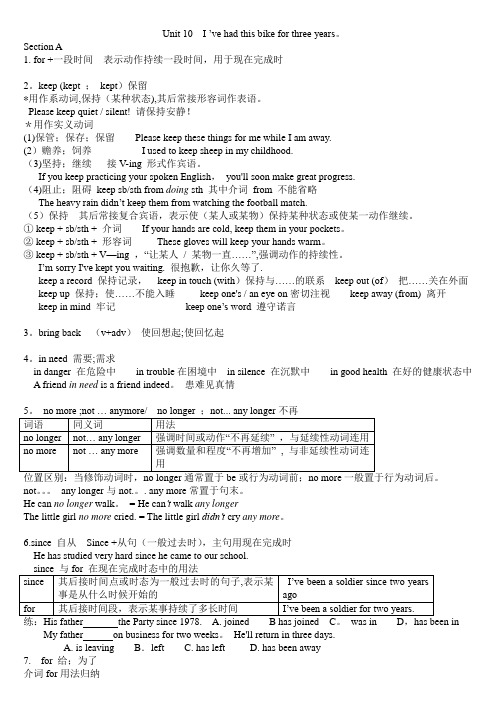
Unit 10 I ’ve had this bike for three years。
Section A1. for +一段时间表示动作持续一段时间,用于现在完成时2。
keep (kept ;kept)保留*用作系动词,保持(某种状态),其后常接形容词作表语。
Please keep quiet / silent! 请保持安静!*用作实义动词(1)保管;保存;保留Please keep these things for me while I am away.(2)赡养;饲养I used to keep sheep in my childhood.(3)坚持;继续接V-ing 形式作宾语。
If you keep practicing your spoken English,you'll soon make great progress.(4)阻止;阻碍keep sb/sth from doing sth 其中介词from 不能省略The heavy rain didn’t keep them from watchin g the football match.(5)保持其后常接复合宾语,表示使(某人或某物)保持某种状态或使某一动作继续。
① keep + sb/sth + 介词If your hands are cold, keep them in your pockets。
② keep + sb/sth + 形容词These gloves will keep your hands warm。
③ keep + sb/sth + V—ing ,“让某人/ 某物一直……”,强调动作的持续性。
I’m sorry I've kept you waiting. 很抱歉,让你久等了.keep a record 保持记录,keep in touch (with)保持与……的联系keep out (of)把……关在外面keep up 保持;使……不能入睡keep one's / an eye on密切注视keep away (from) 离开keep in mind 牢记keep one’s word 遵守诺言3。
现在完成时Since和for的用法
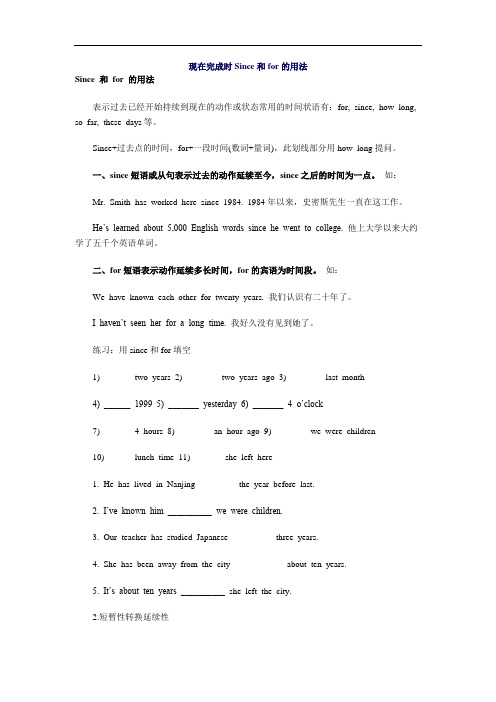
现在完成时Since和for的用法Since 和for 的用法表示过去已经开始持续到现在的动作或状态常用的时间状语有:for, since, how long, so far, these days等。
Since+过去点的时间,for+一段时间(数词+量词),此划线部分用how long提问。
一、since短语或从句表示过去的动作延续至今,since之后的时间为一点。
如:Mr. Smith has worked here since 1984. 1984年以来,史密斯先生一直在这工作。
He’s learned about 5,000 English words since he went to college. 他上大学以来大约学了五千个英语单词。
二、for短语表示动作延续多长时间,for的宾语为时间段。
如:We have known each other for twenty years. 我们认识有二十年了。
I haven’t seen her for a long time. 我好久没有见到她了。
练习:用since和for填空1) ______ two years 2) _______ two years ago 3) _______ last month4) ______ 1999 5) _______ yesterday 6) _______ 4 o’clock7) ______ 4 hours 8) _______ an hour ago 9) _______ we were children10) _____ lunch time 11) ______ she left here1. He has lived in Nanjing ________ the year before last.2. I’ve known him __________ we were children.3. Our teacher has studied Japanese _________ three years.4. She has been away from the city ___________ about ten years.5. It’s about ten years __________she left the city.2.短暂性转换延续性①arrive at/in sw. get to/reach sw. come/go/move to sw.→ be in sw./at school/at home/on the farm/be here/be there1) He got to Beijing five minutes ago.He ________ _________ _________ Beijing for _________ _________.2) I moved to the USA last year.I ________ ________ __________ the USA since __________ __________.3) I went home yesterday.I _______ ________ _________ home for _________ __________.4) They came here last week.They _________ _________ here since _________ __________.②come/go back, return → be back come/go out → be out1) He came out two years ago.He _________ __________ _________ for __________ __________.2) We return to Fuzhou yesterday.We ________ ________ _________ to Fuzhou since __________.③become → be1) I became a teacher in 2000.I ________ __________ a teacher for _________ _________.2) The river became dirty last year.The river _________ _________ dirty for _________ __________.④close → be closed open → be open1) The shop closed two hours ago.The shop ________ _________ _________ for _________ _________.2) The door opened at six in the morning.The door ________ ________ ________ for six hours.⑤get up → be up die → be deadleave sw. → be away from sw.fall asleep/get tot sleep → be asleepfinish/end → be over marry → be married1) I got up two hours ago.I ________ ________ ________ since ________ ________.2) He left Fuzhou just now.He _______ ________ ________ _________ Fuzhou for five minutes.3) My grandpa died in 2002.My grandpa _______ _______ ________for _______ ________.4) The meeting finished at six.The meeting ________ ______ ______ for six hours.5) I got to sleep two hours ago.I ________ _________ _________ since _________ __________.6) They married in 1990.They ________ _________ __________since _________.⑥start/begin to do sth. → do sth. begin → be on1) I began to teach at this school in 1995.I ____ ____ at this school since ____.2) The film began two minutes ago.The film ____ ____ ____ for ____ ____.⑦borrow → keep lose → not have buy → have put on → wearcatch/get a cold → have a cold get to know → know1) They borrowed it last week.They _________ _________ it since __________ __________.2) I bought a pen two hours ago.I _________ _________ a pen for ________ __________.3) I got to know him last year.I _________ __________ him since __________ __________.4) I put on my glasses three years ago.I __________ __________ my glasses for _________ _________.⑧have/has gone to → have been in1) He has gone to Beijing.He ____ ____ _____ Beijing for two days.⑨join the league/the Party/the army→ be a league/a Party member/a soldier→ be a membe r of the league/the Party→ be in the league/the Party/the army1) He joined the league in 2002.He ________ _________ a _________ _________ for two years.He ________ __________ a __________ ___________ the __________ for two years.He ____________ ___________ ___________ the league for two years.2) My brother joined the army two years ago.My brother __________ __________ a ___________ for ___________ ___________. My brother ___________ ___________ in ____________ ___________ for two years.3.汉译英1)这本字典我已买了三年了。
英语人教版八年级下册since 和 for的用法
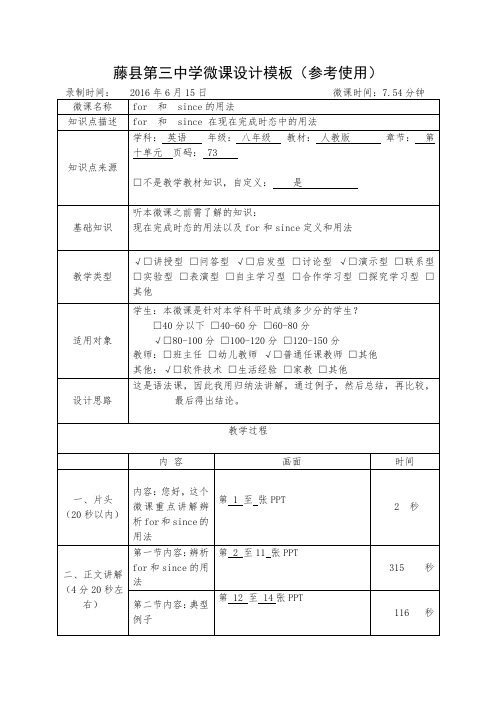
藤县第三中学微课设计模板(参考使用)录制时间: 2016年6月15日微课时间:7.54分钟微课名称for 和 since的用法知识点描述for 和 since 在现在完成时态中的用法知识点来源学科:英语年级:八年级教材:人教版章节:第十单元页码: 73□不是教学教材知识,自定义:是基础知识听本微课之前需了解的知识:现在完成时态的用法以及for和since定义和用法教学类型√□讲授型□问答型√□启发型□讨论型√□演示型□联系型□实验型□表演型□自主学习型□合作学习型□探究学习型□其他适用对象学生:本微课是针对本学科平时成绩多少分的学生?□40分以下□40-60分□60-80分√□80-100分□100-120分□120-150分教师:□班主任□幼儿教师√□普通任课教师□其他其他:√□软件技术□生活经验□家教□其他设计思路这是语法课,因此我用归纳法讲解,通过例子,然后总结,再比较,最后得出结论。
教学过程内容画面时间一、片头(20秒以内)内容:您好,这个微课重点讲解辨析for和since的用法第 1 至张PPT2秒二、正文讲解(4分20秒左右)第一节内容:辨析for和since的用法第 2 至11 张PPT315 秒第二节内容:典型例子第 12 至 14张PPT116 秒第三节内容:总结内容第 15 至张PPT40 秒三、结尾(20秒以内)内容:感谢大家能认真的听完这个微课,希望大家回去后多做练习加以巩固。
第 16至张PPT 1 秒教学反思(自我评价)本微课通过用PPT的方式讲解了for和since的用法,因为是辨析两个单词的用法,因此我用了归纳法进行讲解,让学生在例子中发现规律,然后进行总结。
但是,在讲解的过程中,我所举的例子可能太少了,给学生思考和练习的时间也很少,中等以下的学生可能对知识点还不是很理解。
通过这节微课,我觉得在以后教学中,我要认真分析学生的认知能力,顾及大部分学生,然后寻找更好的教学方法,或者在讲解释可以使用多种方法,归纳法或者演绎法等,让学生理解所教授的内容。
而今完成时Since和for的用法
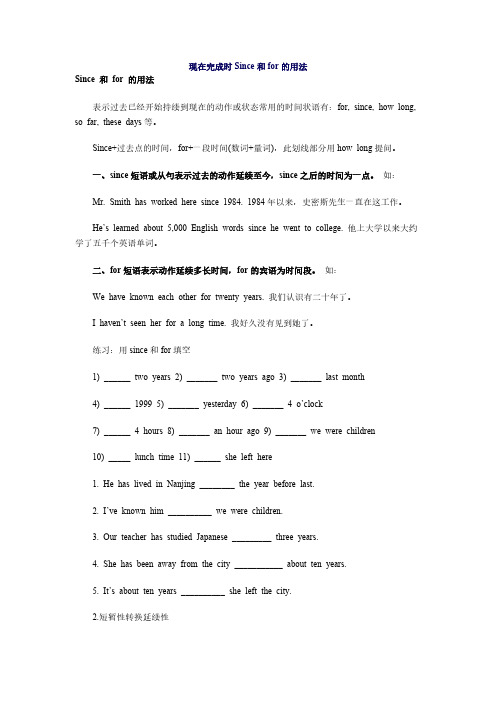
现在完成时Since和for的用法Since 和for 的用法 表示过去已经开始持续到现在的动作或状态常用的时间状语有:for, since, how long, so far, these days等。
Since+过去点的时间,for+一段时间(数词+量词),此划线部分用how long提问。
一、since短语或从句表示过去的动作延续至今,since之后的时间为一点。
如: Mr. Smith has worked here since 1984. 1984年以来,史密斯先生一直在这工作。
He’s learned about 5,000 English words since he went to college. 他上大学以来大约学了五千个英语单词。
二、for短语表示动作延续多长时间,for的宾语为时间段。
如: We have known each other for twenty years. 我们认识有二十年了。
I haven’t seen her for a long time. 我好久没有见到她了。
练习:用since和for填空 1) ______ two years 2) _______ two years ago 3) _______ last month 4) ______ 1999 5) _______ yesterday 6) _______ 4 o’clock 7) ______ 4 hours 8) _______ an hour ago 9) _______ we were children 10) _____ lunch time 11) ______ she left here 1. He has lived in Nanjing ________ the year before last. 2. I’ve known him __________ we were children. 3. Our teacher has studied Japanese _________ three years. 4. She has been away from the city ___________ about ten years. 5. It’s about ten years __________ she left the city. 2.短暂性转换延续性 ①arrive at/in sw. get to/reach sw. come/go/move to sw. →be in sw./at school/at home/on the farm/be here/be there 1) He got to Beijing five minutes ago. He ________ _________ _________ Beijing for _________ _________. 2) I moved to the USA last year. I ________ ________ __________ the USA since __________ __________. 3) I went home yesterday. I _______ ________ _________ home for _________ __________. 4) They came here last week. They _________ _________ here since _________ __________. ②come/go back, return →be back come/go out →be out 1) He came out two years ago. He _________ __________ _________ for __________ __________. 2) We return to Fuzhou yesterday. We ________ ________ _________ to Fuzhou since __________. ③become →be 1) I became a teacher in 2000. I ________ __________ a teacher for _________ _________. 2) The river became dirty last year. The river _________ _________ dirty for _________ __________. ④close →be closed open →be open 1) The shop closed two hours ago. The shop ________ _________ _________ for _________ _________. 2) The door opened at six in the morning. The door ________ ________ ________ for six hours. ⑤get up →be up die →be dead leave sw. →be away from sw. fall asleep/get tot sleep →be asleep finish/end →be over marry →be married 1) I got up two hours ago. I ________ ________ ________ since ________ ________. 2) He left Fuzhou just now. He _______ ________ ________ _________ Fuzhou for five minutes. 3) My grandpa died in 2002. My grandpa _______ _______ ________for _______ ________. 4) The meeting finished at six. The meeting ________ ______ ______ for six hours. 5) I got to sleep two hours ago. I ________ _________ _________ since _________ __________. 6) They married in 1990. They ________ _________ __________since _________. ⑥start/begin to do sth. →do sth. begin →be on 1) I began to teach at this school in 1995. I ____ ____ at this school since ____. 2) The film began two minutes ago. The film ____ ____ ____ for ____ ____. ⑦borrow →keep lose →not have buy →have put on →wear catch/get a cold →have a cold get to know →know 1) They borrowed it last week. They _________ _________ it since __________ __________. 2) I bought a pen two hours ago. I _________ _________ a pen for ________ __________. 3) I got to know him last year. I _________ __________ him since __________ __________. 4) I put on my glasses three years ago. I __________ __________ my glasses for _________ _________. ⑧have/has gone to →have been in 1) He has gone to Beijing. He ____ ____ _____ Beijing for two days. ⑨join the league/the Party/the army →be a league/a Party member/a soldier →be a member of the league/the Party →be in the league/the Party/the army 1) He joined the league in 2002. He ________ _________ a _________ _________ for two years. He ________ __________ a __________ ___________ the __________ for two years. He ____________ ___________ ___________ the league for two years. 2) My brother joined the army two years ago. My brother __________ __________ a ___________ for ___________ ___________. My brother ___________ ___________ in ____________ ___________ for two years. 3.汉译英 1)这本字典我已买了三年了。
八年级英语下册 Unit 10 I’ve had this bike for three years知识点总结素材 (新版)人教新目标版
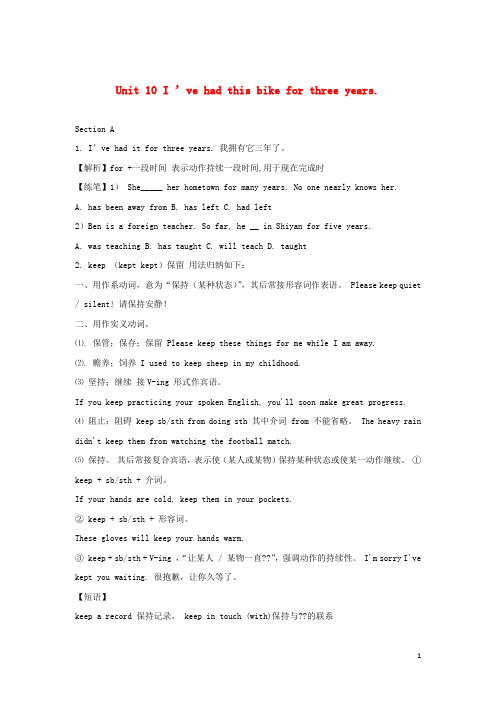
Unit 10 I ’ve had this bike for three years.Section A1. I’ve had it for three years. 我拥有它三年了。
【解析】for +一段时间表示动作持续一段时间,用于现在完成时【练笔】1) She_____ her hometown for many years. No one nearly knows her.A. has been away fromB. has leftC. had left2)Ben is a foreign teacher. So far, he __ in Shiyan for five years.A. was teachingB. has taughtC. will teachD. taught2. keep (kept kept)保留用法归纳如下:一、用作系动词,意为“保持(某种状态)”,其后常接形容词作表语。
Please keep quiet / silent! 请保持安静!二、用作实义动词,⑴. 保管;保存;保留 Please keep these things for me while I am away.⑵. 赡养;饲养 I used to keep sheep in my childhood.⑶坚持;继续接V-ing 形式作宾语。
If you keep practicing your spoken English, you'll soon make great progress.⑷阻止;阻碍 keep sb/sth from doing sth 其中介词 from 不能省略。
The heavy rain didn't keep them from watching the football match.⑸保持。
其后常接复合宾语,表示使(某人或某物)保持某种状态或使某一动作继续。
现在完成时Since和for的用法
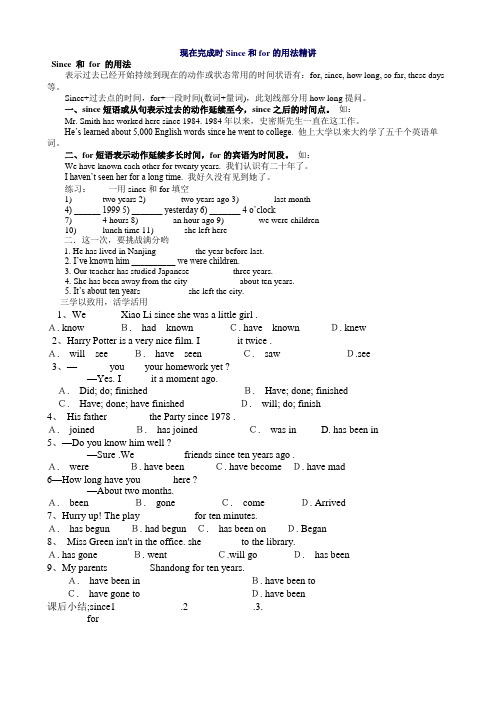
现在完成时Since和for的用法精讲Since 和for 的用法表示过去已经开始持续到现在的动作或状态常用的时间状语有:for, since, how long, so far, these days 等。
Since+过去点的时间,for+一段时间(数词+量词),此划线部分用how long提问。
一、since短语或从句表示过去的动作延续至今,since之后的时间点。
如:Mr. Smith has worked here since 1984. 1984年以来,史密斯先生一直在这工作。
He’s learned about 5,000 English words since he went to college. 他上大学以来大约学了五千个英语单词。
二、for短语表示动作延续多长时间,for的宾语为时间段。
如:We have known each other for twenty years. 我们认识有二十年了。
I haven’t seen her for a long time. 我好久没有见到她了。
练习:一用since和for填空1) ______ two years 2) _______ two years ago 3) _______ last month4) ______ 1999 5) _______ yesterday 6) _______ 4 o’clock7) ______ 4 hours 8) _______ an hour ago 9) _______ we were children10) _____ lunch time 11) ______ she left here二.这一次,要挑战满分哟1. He has lived in Nanjing ________ the year before last.2. I’ve known him __________ we were children.3. Our teacher has studied Japanese _________ three years.4. She has been away from the city ___________ about ten years.5. It’s about ten year s __________ she left the city.三学以致用,活学活用1、We ______ Xiao Li since she was a little girl .A. know B. had known C. have known D. knew2、Harry Potter is a very nice film. I_______ it twice .A. will see B. have seen C. saw D.see3、—______ you ___ your homework yet ?—Yes. I _____ it a moment ago.A. Did; do; finished B. Have; done; finishedC. Have; done; have finished D. will; do; finish4、His father ______ the Party since 1978 .A. joined B. has joined C. was in D. has been in5、—Do you know him well ?—Sure .We _________ friends since ten years ago .A. were B. have been C. have become D. have mad6—How long have you ____ here ?—About two months.A. been B. gone C. come D. Arrived7、Hurry up! The play __________ for ten minutes.A. has begun B. had begun C. has been on D. Began8、Miss Green isn't in the office. she _______ to the library.A. has gone B. went C.will go D. has been9、My parents ______ Shandong for ten years.A. have been in B. have been toC. have gone to D. have been课后小结;since1_____________.2_____________.3. _____________for_____________。
人教版英语八年级下册现在完成时(易懂版本)
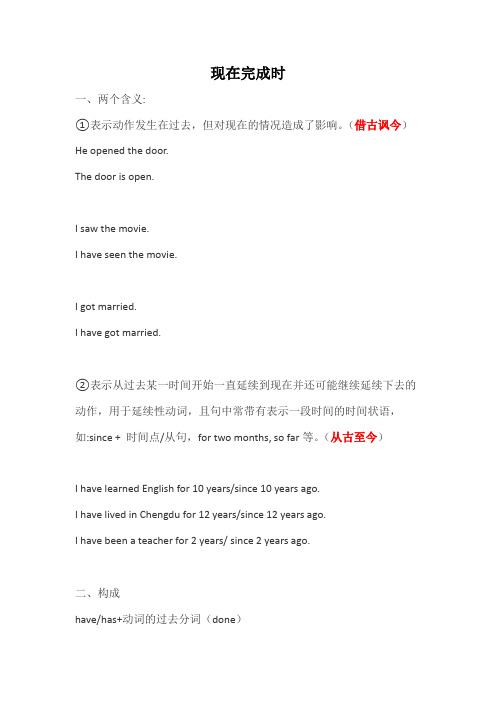
现在完成时一、两个含义:①表示动作发生在过去,但对现在的情况造成了影响。
(借古讽今)He opened the door.The door is open.I saw the movie.I have seen the movie.I got married.I have got married.②表示从过去某一时间开始一直延续到现在并还可能继续延续下去的动作,用于延续性动词,且句中常带有表示一段时间的时间状语,如:since + 时间点/从句,for two months, so far等。
(从古至今)I have learned English for 10 years/since 10 years ago.I have lived in Chengdu for 12 years/since 12 years ago.I have been a teacher for 2 years/ since 2 years ago.二、构成have/has+动词的过去分词(done)三、标志词for, since, already, yet, before, recently, over the …., in the past few…..四、already与yet的区别already用于肯定句(已经)yet用于否定句(还)和疑问句(已经)ever & neverever作副词,意为“曾经”,常用于现在完成时的一般疑问句和肯定句中,置于主语之后,过去分词之前。
never作副词,意为“从不;从未”,用于现在完成时中,表示否定,位于助动词have/has之后,过去分词之前。
五.have been to & have gone to & have been inhave been to 去了某地,已回have gone to 去了某地,未回have been in 在哪里待了多久后面是地点副词there、here、home 时,省略to六、延续性和非延续性1. 含义:延续性动词表示能够延续的动作,这种动作可以延续下去或产生持久影响。
for和since现在完成时的用法
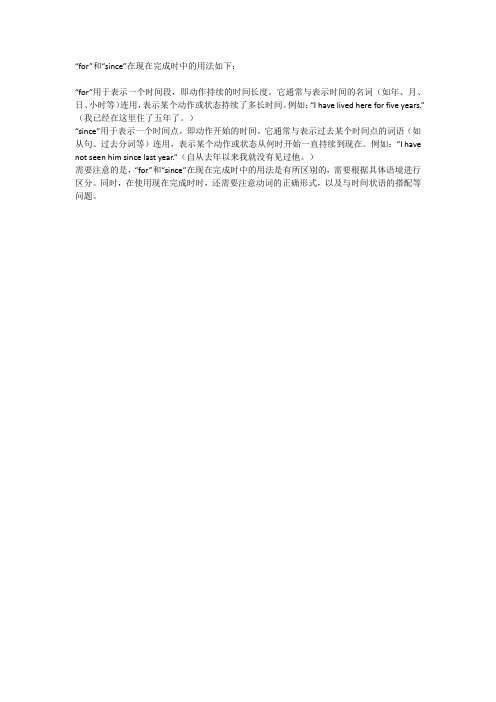
“for”和“since”在现在完成时中的用法如下:
“for”用于表示一个时间段,即动作持续的时间长度。
它通常与表示时间的名词(如年、月、日、小时等)连用,表示某个动作或状态持续了多长时间。
例如:“I have lived here for five years.”(我已经在这里住了五年了。
)
“since”用于表示一个时间点,即动作开始的时间。
它通常与表示过去某个时间点的词语(如从句、过去分词等)连用,表示某个动作或状态从何时开始一直持续到现在。
例如:“I have not seen him since last year.”(自从去年以来我就没有见过他。
)
需要注意的是,“for”和“since”在现在完成时中的用法是有所区别的,需要根据具体语境进行区分。
同时,在使用现在完成时时,还需要注意动词的正确形式,以及与时间状语的搭配等问题。
英语人教版八年级下册Present perfect tense

He ___________(work) has worked in our school for one year.
came He _______(come) to our school last year.
have cooked They ____________(cook) the supper already. cooked (cook) the supper half an hour ago. They _______
※延续性动词与非延续性动词在现在完 成时态中的使用
(1)在现在完成时态中,延续性动词又称持续性动 词,可与表示一段时间的状语连用。 例如:study, eat, have ,teach, keep, stay等 (2)非延续性动词也称短暂性动词或瞬间性动词, 指表示短时间的动作,这些动词一发生就结束了, 常见的有come, go, arrive, reach, leave, begin, start, buy, join, die, borrow, get up, open, stop, marry等因此不能跟表示一段的时间状语连 用,因此要把它转为相应的延续性动词或短语。
现在完成时态的结构: have/has+动词的过去分词
现在完成时和一般过去时的区别:
现在完成时,强调这一动作产生的结果对现 在的影响,与现在有关。 一般过去时,仅仅表示在过去某一时刻曾发 生过这一动作,与现在无关。 He has studied English for five years.
(学习英语已经五年了,现在仍然在学)
He studied English for five years.
现在完成时
the Present Perfect Tense
现在完成时专项练习100题人教版英语八年级下册
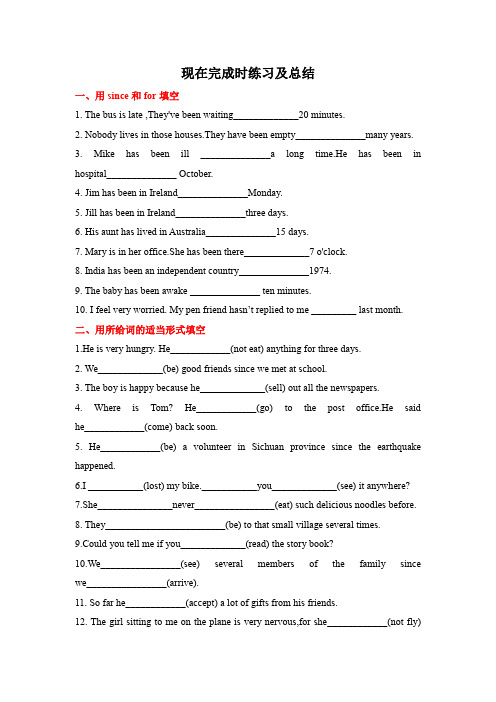
现在完成时练习及总结一、用since和for填空1. The bus is late ,They've been waiting_____________20 minutes.2. Nobody lives in those houses.They have been empty______________many years.3. Mike has been ill ______________a long time.He has been in hospital______________ October.4. Jim has been in Ireland______________Monday.5. Jill has been in Ireland______________three days.6. His aunt has lived in Australia______________15 days.7. Mary is in her office.She has been there_____________7 o'clock.8. India has been an independent country______________1974.9. The baby has been awake ______________ ten minutes.10. I feel very worried. My pen friend hasn’t replied to me _________ last month.二、用所给词的适当形式填空1.He is very hungry. He____________(not eat) anything for three days.2. We_____________(be) good friends since we met at school.3. The boy is happy because he_____________(sell) out all the newspapers.4. Where is Tom? He____________(go) to the post office.He said he____________(come) back soon.5. He____________(be) a volunteer in Sichuan province since the earthquake happened.6.I ___________(lost) my bike.___________you_____________(see) it anywhere?7.She_______________never________________(eat) such delicious noodles before.8. They________________________(be) to that small village several times.9.Could you tell me if you_____________(read) the story book?10.We________________(see) several members of the family since we________________(arrive).11. So far he____________(accept) a lot of gifts from his friends.12. The girl sitting to me on the plane is very nervous,for she____________(not fly)before.13. The result____________(prove) to be right since last week.14.The number of the private cars ____________(increase) greatly since 2008 in the small town.15.Tony____________(not have) got chocolate for his father.16. So far 20 students____________(exchange) their new year gifts with each other.17.She's________________________(live) here ever since she was ten.18. Both of them____________(be) in Jinan for ten days.19.Both of them____________(come) to Beijing ten days ago.20.Half an hour____________(pass) since the train____________(leave).21.Mary_____________(lose) her pen__________you____________(see)it here and there?22._____________you_____________(find) your watch yet?23.---Are you thirsty?---No,I just____________(have) some orange24.I____________already________________________(see) it last week.2____________(be) to Hong Kong twice.26.the young woman ever____________(travel) to England?27.____________you_____________(read) Gone with the Wind yet?28. My father____________just____________(come) back from work.He looks very tired.29. ---Where's Li Ming?----He____________(go)to the teacher’s office.30.He ____________(work) here since he ____________(move) here in 1999.31. So far I____________(make) quite a few friends here.32. He____________(study) English for five years.33.We____________(learn) 3000 English words up to now.34. The students____________(study) in the middle school since last month.35. My father____________(read) the novel twice.36. My father________never_________(drink) soft drinks,but he________(drink) some last week.37.I___________________(eat) too much.I can't eat any more.38. The farmer__________________(cut) some rice and____________(put) it in his house last autumn.39. The little girl_________________________(learn) 1000 words so far.40.Tom___________(be) away for three days since he_________(leave) home.41. My next-door neighbour____________(do)exercise yesterday morning.42.It____________(be) ten years since he_____________(come)here.43. There_______________(be) a piece of meat and two tomatoes in the kitchen,but now there is nothing left.44._____________the chef______________(cook) the meal? Everyone here is hungry.45.____________the shirt____________(cost) him 500 yuan?46._____________he____________(return) the book to the library?--Not yet.47.I____________(spend) three hours____________(practise) the piano last weekend.48.He______________just___________________(tell) us a story.49.He_________________(tell) us a story just now.50._______________you________________(tidy) up the room yet?5 visitors_____________(reach) Yunnan the day before yesterday.5_________________(be) two years since he__________(become) a cook.5_________________(be) to Scotland.54. We____________(read) that book.5____________(live) here for three years.5_____________(know) David for ten years.57. She____________(not/see) him for a long time.58.We____________(be) here for two weeks.59.1________________(lose) my keys.60.He_________________(drink) too much coffee.三、改写句子have missed the train.一般疑问句:__________________________________________________.肯定回答:__________________________________________________.否定回答:__________________________________________________. 2.My brother has been in the army since1999.否定句:__________________________________________________.一般疑问句:__________________________________________________.肯定回答:__________________________________________________.否定回答:__________________________________________________. 3.Mary has joined the badminton club since last term.否定句:__________________________________________________.一般疑问句:__________________________________________________.肯定回答:__________________________________________________.否定回答:__________________________________________________. 4.We have been to Japan twice.否定句:__________________________________________________.一般疑问句:__________________________________________________.肯定回答:__________________________________________________.否定回答:__________________________________________________. 5.I have already returned the book.否定句:__________________________________________________.一般疑问句:__________________________________________________.肯定回答:__________________________________________________.否定回答:__________________________________________________. 6.Our school has changed a lot recently.否定句:__________________________________________________.一般疑问句:__________________________________________________.肯定回答:__________________________________________________.否定回答:__________________________________________________. 7.I have worked here since I moved here in 1999.一般疑问句:__________________________________________________.肯定回答:__________________________________________________.否定回答:__________________________________________________.8.It has been two years since we met two years ago.否定句:__________________________________________________.一般疑问句:__________________________________________________.肯定回答:__________________________________________________.否定回答:__________________________________________________.9.He has just done his homework.否定句:__________________________________________________.一般疑问句:__________________________________________________.肯定回答:__________________________________________________.否定回答:__________________________________________________.10.I've been there before.否定句:__________________________________________________.一般疑问句:__________________________________________________.肯定回答:__________________________________________________.否定回答:__________________________________________________.四、选择题1. It has been ten years____________I last saw her.A. afterB. sinceC. For2.-Your scarf is so beautiful! When did you buy it?____________it for 6 years.A. boughtB. will haveC. have hadD. have bought3.-How long____________you______________in Xiangxi?-Since 16 years ago.A.did, goB. have, beenC. have, gonesaw Mr.Li in his office just now.-No, it____________be him. He has____________Guangzhou and will be back in two days.A.mustn’t, gone toB.mustn’t,been toC.can’t, been toD. can't, gone to5.-Our computer is working again!-Yes. Our IT teacher____________it. It took him about an hour.A. has fixedB. will fixC. is fixingD. was fixing6.Mr. Smith____________Chinese for two years.He’s much better at it now.A. learnsB. was learningC. has learnedD. will learn7.-Would you like something to drink?-No, thanks. I____________some tea already.A. have drunkB. was drinkingC. will drinkD. drink8.-Do you know Mount Wudang in Shiyan?-Yes,I____________it twice. It’s fantastic.A. had climbedB. climbC. climbedD. have climbed9.Peter’s mother died three years ago. It has been three years since his mother__________.C.has been deadD.has died10. My mother_____________a good example for me since I was young.B.has beenC.will be11. We____________each other since I came to Beijing but we send emails often.A.don’t seeB.didn’t seeC.won't seeD.haven’t seen12.-They say there’s a new restaurant nearby-Yes, and it_________ for no more than a week.A.has been openD.is opened13. They have_____________since the factory opened.A.left the schoolB.joined the teamC.become workersD.worked here14.His father____________for years.A.has diedB. has been deadC. diedD. dies15.Mary____________to see the films because she____________it twice.A. won't go,sawB. won’t go, will seeC. won't go, has seenD. didn’t go, sees16.____________you________England? Yes,it_______ a beautiful country.A. Will , gone to, wasB.Have, been to, isC. had ,been to, isD. Have,gone to, is17.-------____________you_____________to the capital?-------No, I________there early next month.A. Have,been, haven’t, am goingB.Had, been, hadn’t, am goingC. Have, gone, haven’t, was goingD. Did,go, didn’t, was going18. The famous writer_____________one new book in the past two year.A. is writingB. was writingD. has written19. -Our country____________a lot so far .-Yes. I hope it will be even_____________.A. has changed; wellB. changed; goodC.has changed: betterD. changed; better20. Harry Potter is a very nice film .I_________________________it twice.A. will seeB. have seenD. see五、保持句意不变(变成完成时态句子)1. The film began ten minutes ago.___________________________________________________.2.He hasn't come to school because he was ill.___________________________________________________.3.The old man died last year.___________________________________________________.4.My brother has been in the army for four years.___________________________________________________.5.Alice borrowed a computer from her sister two hours ago.___________________________________________________.6.The train arrived here ten minutes ago.___________________________________________________.7.The shop opened three days ago.___________________________________________________.8.The factory has closed since five years ago.___________________________________________________.9.Mr Green left twenty minutes ago.___________________________________________________.10.He left his hometown ten years ago.___________________________________________________.六、现在完成时1.句型:have/has done2.定义:2.1过去发生的动作对现在产生影响。
现在完成时Since和for的用法
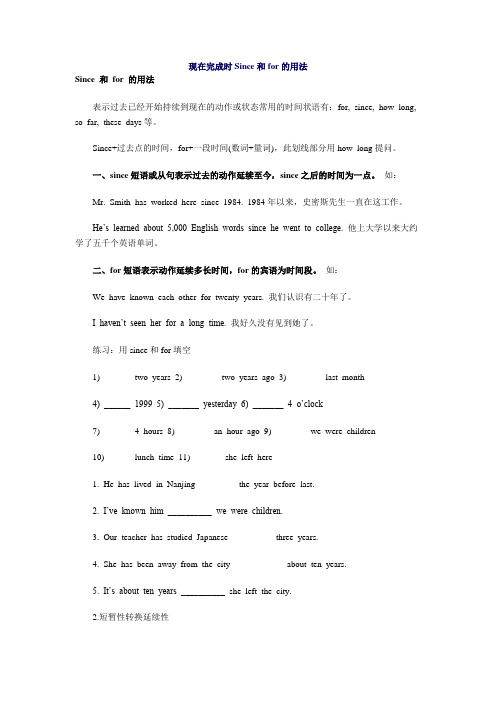
现在完成时Since和for的用法Since 和for 的用法表示过去已经开始持续到现在的动作或状态常用的时间状语有:for, since, how long, so far, these days等。
Since+过去点的时间,for+一段时间(数词+量词),此划线部分用how long提问。
一、since短语或从句表示过去的动作延续至今,since之后的时间为一点。
如:Mr. Smith has worked here since 1984. 1984年以来,史密斯先生一直在这工作。
He’s learned about 5,000 English words since he went to college. 他上大学以来大约学了五千个英语单词。
二、for短语表示动作延续多长时间,for的宾语为时间段。
如:We have known each other for twenty years. 我们认识有二十年了。
I haven’t seen her for a long time. 我好久没有见到她了。
练习:用since和for填空1) ______ two years 2) _______ two years ago 3) _______ last month4) ______ 1999 5) _______ yesterday 6) _______ 4 o’clock7) ______ 4 hours 8) _______ an hour ago 9) _______ we were children10) _____ lunch time 11) ______ she left here1. He has lived in Nanjing ________ the year before last.2. I’ve known him __________ we were children.3. Our teacher has studied Japanese _________ three years.4. She has been away from the city ___________ about ten years.5. It’s about ten years __________she left the city.2.短暂性转换延续性①arrive at/in sw. get to/reach sw. e/go/move to sw.→ be in sw./at school/at home/on the farm/be here/be there1) He got to Beijing five minutes ago.He ________ _________ _________ Beijing for _________ _________.2) I moved to the USA last year.I ________ ________ __________ the USA since __________ __________.3) I went home yesterday.I _______ ________ _________ home for _________ __________.4) They came here last week.They _________ _________ here since _________ __________.②e/go back, return → be back e/go out → be out1) He came out two years ago.He _________ __________ _________ for __________ __________.2) We return to Fuzhou yesterday.We ________ ________ _________ to Fuzhou since __________.③bee → be1) I became a teacher in 2000.I ________ __________ a teacher for _________ _________.2) The river became dirty last year.The river _________ _________ dirty for _________ __________.④close → be closed open → be ope n1) The shop closed two hours ago.The shop ________ _________ _________ for _________ _________.2) The door opened at six in the morning.The door ________ ________ ________ for six hours.⑤get up → be up die → be deadleave sw. → be away fr om sw.fall asleep/get tot sleep → be asleepfinish/end → be over marry → be married1) I got up two hours ago.I ________ ________ ________ since ________ ________.2) He left Fuzhou just now.He _______ ________ ________ _________ Fuzhou for five minutes.3) My grandpa died in 2002.My grandpa _______ _______ ________for _______ ________.4) The meeting finished at six.The meeting ________ ______ ______ for six hours.5) I got to sleep two hours ago.I ________ _________ _________ since _________ __________.6) They married in 1990.They ________ _________ __________since _________.⑥start/begin to do sth. → do sth. begin → be on1) I began to teach at this school in 1995.I ____ ____ at this school since ____.2) The film began two minutes ago.The film ____ ____ ____ for ____ ____.⑦borrow → keep lose → not have buy → have put on → wearcatch/get a cold → have a cold get to know → know1) They borrowed it last week.They _________ _________ it since __________ __________.2) I bought a pen two hours ago.I _________ _________ a pen for ________ __________.3) I got to know him last year.I _________ __________ him since __________ __________.4) I put on my glasses three years ago.I __________ __________ my glasses for _________ _________.⑧have/has gone to → have been in1) He has gone to Beijing.He ____ ____ _____ Beijing for two days.⑨join the league/the Party/the army→ be a league/a Party member/a soldier→ be a member of the lea gue/the Party→ be in the league/the Party/the army1) He joined the league in 2002.He ________ _________ a _________ _________ for two years.He ________ __________ a __________ ___________ the __________ for two years.He ____________ ___________ ___________ the league for two years.2) My brother joined the army two years ago.My brother __________ __________ a ___________ for ___________ ___________. My brother ___________ ___________ in ____________ ___________ for two years.3.汉译英1)这本字典我已买了三年了。
现在完成时专项训练人教版八年级英语下册(1)
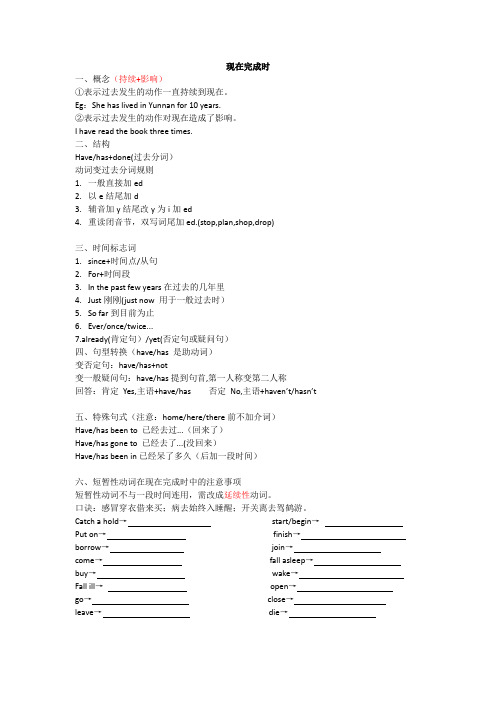
现在完成时一、概念(持续+影响)①表示过去发生的动作一直持续到现在。
Eg:She has lived in Yunnan for 10 years.②表示过去发生的动作对现在造成了影响。
I have read the book three times.二、结构Have/has+done(过去分词)动词变过去分词规则1.一般直接加ed2.以e结尾加d3.辅音加y结尾改y为i加ed4.重读闭音节,双写词尾加ed.(stop,plan,shop,drop)三、时间标志词1.since+时间点/从句2.For+时间段3.In the past few years在过去的几年里4.Just刚刚(just now 用于一般过去时)5.So far到目前为止6.Ever/once/twice...7.already(肯定句)/yet(否定句或疑问句)四、句型转换(have/has 是助动词)变否定句:have/has+not变一般疑问句:have/has提到句首,第一人称变第二人称回答:肯定Yes,主语+have/has 否定No,主语+haven’t/hasn’t五、特殊句式(注意:home/here/there前不加介词)Have/has been to 已经去过...(回来了)Have/has gone to 已经去了...(没回来)Have/has been in已经呆了多久(后加一段时间)六、短暂性动词在现在完成时中的注意事项短暂性动词不与一段时间连用,需改成延续性动词。
口诀:感冒穿衣借来买;病去始终入睡醒;开关离去驾鹤游。
Catch a hold→start/begin→Put on→finish→borrow→join→come→fall asleep→buy→wake→Fall ill→open→go→close→leave→die→习题练习一、写出下列动词的过去分词。
1.plan→→2.like→→5.cut→→6.get→→9.break→→二、用for/since 填空。
八年级下册现在完成时态-考点汇总(初二英语下)
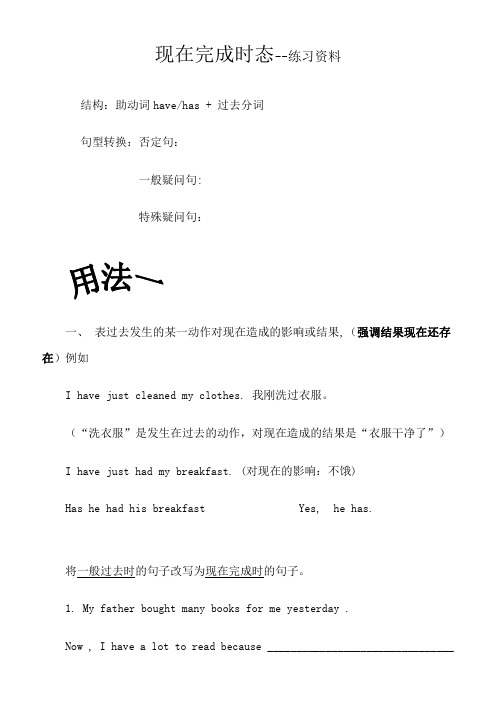
现在完成时态--练习资料结构:助动词have/has + 过去分词句型转换:否定句:一般疑问句:特殊疑问句:一、表过去发生的某一动作对现在造成的影响或结果,(强调结果现在还存在)例如I have just cleaned my clothes. 我刚洗过衣服。
(“洗衣服”是发生在过去的动作,对现在造成的结果是“衣服干净了”)I have just had my breakfast. (对现在的影响:不饿)Has he had his breakfast Yes, he has.将一般过去时的句子改写为现在完成时的句子。
1. My father bought many books for me yesterday .Now , I have a lot to read because ________________________________2. I saw this film last week.Now, I know this film because I_____________________.3. I did my homework yesterday.Now, I can give it to the teacher because I______________二、通常与表示包括现在在内的时间副词 just (谓语动词之前) (刚刚),already(已经(肯定句) ), before(之前), yet(一般疑问(句末),已经;否定句:还) never(从不), ever (疑问句) twice(两次),recently(近来)等状语连用,可以和瞬间动词和持续性动词连用,1 Tom has already finished his homework.Tom hasn’t finished his homework yet.2 I have just had my lunch.She hasn’t seen you befor e.3 Have you e ver eaten fishI have never eaten fish三、体会时间状语:① I have never heard of that before.② Have you ever ridden a horse③ She has already finished the work.④ Have you milked the cow yetYes, I have done that already.⑤ I’ve just finished my homework.⑥ He has not come yet.四、请先圈出时间状语,再用词的适当形式填空1. I ________(have) lunch already.2. the train_______ (arrive) yet ____ never_______ (be ) to China.4. The twin ______just _____(see) my father.5. The twins ____(see) my father just now. you ever _______(ride) a horse Never.you ________(clean) the roomYes, we__________(do) that already.When _______ you ______(do) itWe _______(do) it an hour ago.he ______(see) this film yet No.When _____ he _____(see) itHe ______ it tomorrow.9. How many times _____you______(come) hereOnce.五、翻译句子:1 你已经问过这个问题两边了,别再烦我了。
最新人教版英语八年级下册Unit8-10语法重难点:现在完成时 专项复习 (有答案)
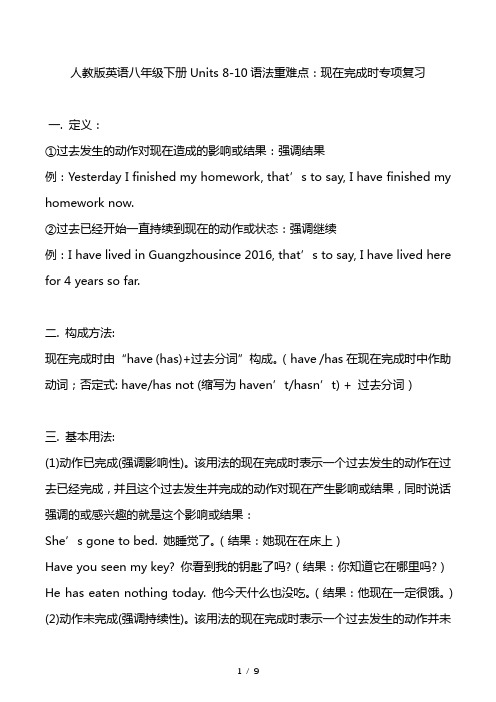
人教版英语八年级下册Units 8-10语法重难点:现在完成时专项复习一. 定义:①过去发生的动作对现在造成的影响或结果:强调结果例:Yesterday I finished my homework, that’s to say, I have finished my homework now.②过去已经开始一直持续到现在的动作或状态:强调继续例:I have lived in Guangzhousince 2016, that’s to say, I have lived here for 4 years so far.二. 构成方法:现在完成时由“have (has)+过去分词”构成。
(have /has在现在完成时中作助动词;否定式: have/has not (缩写为haven’t/hasn’t) + 过去分词)三. 基本用法:(1)动作已完成(强调影响性)。
该用法的现在完成时表示一个过去发生的动作在过去已经完成,并且这个过去发生并完成的动作对现在产生影响或结果,同时说话强调的或感兴趣的就是这个影响或结果:She’s gone to bed. 她睡觉了。
(结果:她现在在床上)Have you seen my key? 你看到我的钥匙了吗?(结果:你知道它在哪里吗?)He has eaten nothing today. 他今天什么也没吃。
(结果:他现在一定很饿。
)(2)动作未完成(强调持续性)。
该用法的现在完成时表示一个过去发生的动作并未在过去完成,而是一直持续到现在,并且有可能继续下去(也可能到此结束):Have you waited long? 你等了很久吗?We have been busy this afternoon. 今天下午我们一直很忙。
I抳e waited a week for your answer. 等你的回答我等了一个星期。
除以上用法外,现在完成时还可表示过去的重复动作甚至将来动作:He has always gone to work by bike. 他总是骑自行车上班。
2020年春八年级人教版英语下册Unit10_I've_had_this_bike_for_three_years.考点聚焦
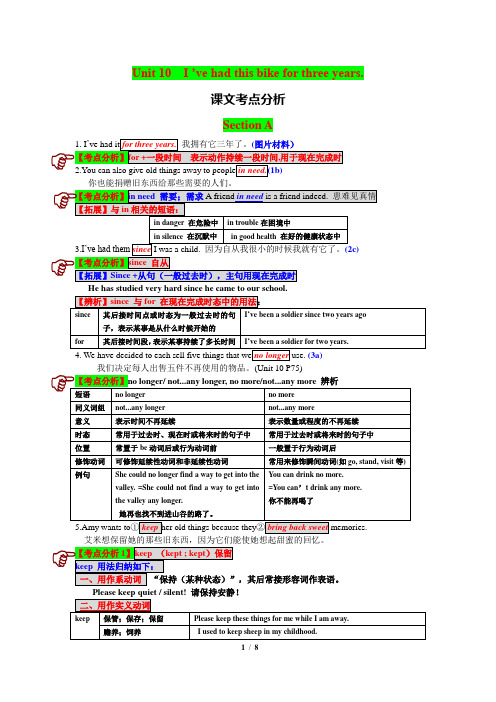
Unit 10 I ’ve had this bike for three years.课文考点分析Section A我们决定每人出售五件不再使用的物品。
(Unit 10 P75)里面的故事或许有点老,但它们仍然很有趣。
The speaker spoke up a bit/a little so as to make himself heard more clearly.There is a little/a bit of food left for lunch. 午饭只能吃剩下的一点食品了。
(2d)(3a)(3a)所以,我们正从卧室里清理出许多东西来办一场庭院拍卖会。
Please clear out the cupboard.(3a)I have no more money to give you.= I don’t have money to give you any more.13. For example , he’it almost every week until he was about seven.(3a)例如,从他四岁生日以来,就已经拥有了这列火车和铁轨的组合,大约七岁之前他几乎每周都要玩这个玩具。
I hope we won’t lose the competition.(3a)16.’tplayed对于我来说,我不想放弃我的足球衫,但说实话,现在我有段时间没踢足球了。
17. What do they want to (3b)Unit 10 I ’ve had this bike for three years.课文考点分析Section B & Self Check(2a)我们通常可以用原有的知识来猜测一篇文章写的是什么。
【注】介词短语作方式状语,回答以How开头的问句,表示“怎样做”。
(2a)(2a)(2a)—She has failed her test again. —That’s a shame!8. Many people like Zhong with great interest how their hometowns have changed.(2a)I regard you as my friend.”(2a)我注意到我的家乡就是这样的” ,钟伟又说道。
现在完成时中for和since的用法
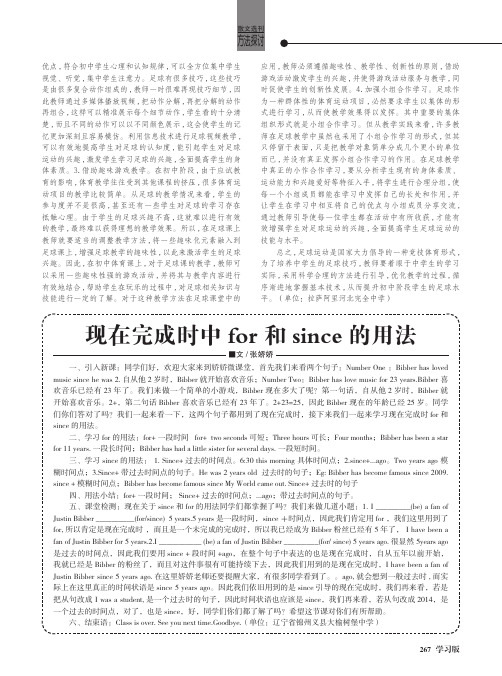
267学习版一、引入新课:同学们好,欢迎大家来到娇娇微课堂,首先我们来看两个句子:Number One :Bibber has loved music since he was 2.自从他2岁时,Bibber 就开始喜欢音乐;Number Two:Bibber has love music for 23 years.Bibber 喜欢音乐已经有23年了。
我们来做一个简单的小游戏,Bibber 现在多大了呢?第一句话,自从他2岁时,Bibber 就开始喜欢音乐。
2+,第二句话Bibber 喜欢音乐已经有23年了。
2+23=25,因此Bibber 现在的年龄已经25岁。
同学们你们答对了吗?我们一起来看一下,这两个句子都用到了现在完成时,接下来我们一起来学习现在完成时for 和since 的用法。
二、学习for 的用法:for+一段时间 for+ two seconds 可短;Three hours 可长;Four months;Bibber has been a star for 11 years. 一段长时间;Bibber has had a little sister for several days.一段短时间。
三、学习since 的用法: 1. Since+过去的时间点。
6:30 this morning 具体时间点;2.since+...ago。
Two years ago 模糊时间点;3.Since+带过去时间点的句子。
He was 2 years old 过去时的句子;Eg: Bibber has become famous since 2009. since +模糊时间点;Bibber has become famous since My World came out. Since+过去时的句子四、用法小结:for+一段时间; Since+过去的时间点;...ago;带过去时间点的句子。
现在完成时Since和for的用法
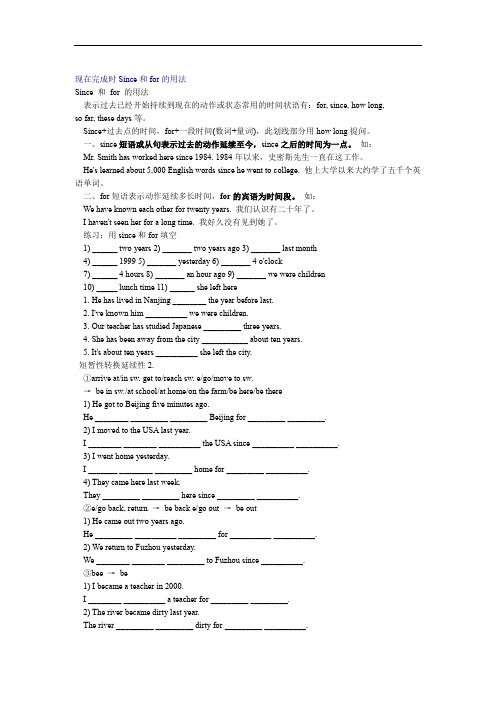
现在完成时Since和for的用法Since 和for 的用法表示过去已经开始持续到现在的动作或状态常用的时间状语有:for, since, how long,so far, these days等。
Since+过去点的时间,for+一段时间(数词+量词),此划线部分用how long提问。
一、since短语或从句表示过去的动作延续至今,since之后的时间为一点。
如:Mr. Smith has worked here since 1984. 1984年以来,史密斯先生一直在这工作。
He's learned about 5,000 English words since he went to college. 他上大学以来大约学了五千个英语单词。
二、for短语表示动作延续多长时间,for的宾语为时间段。
如:We have known each other for twenty years. 我们认识有二十年了。
I haven't seen her for a long time. 我好久没有见到她了。
练习:用since和for填空1) ______ two years 2) _______ two years ago 3) _______ last month4) ______ 1999 5) _______ yesterday 6) _______ 4 o'clock7) ______ 4 hours 8) _______ an hour ago 9) _______ we were children10) _____ lunch time 11) ______ she left here1. He has lived in Nanjing ________ the year before last.2. I've known him __________ we were children.3. Our teacher has studied Japanese _________ three years.4. She has been away from the city ___________ about ten years.5. It's about ten years __________ she left the city.短暂性转换延续性2.①arrive at/in sw. get to/reach sw. e/go/move to sw.→be in sw./at school/at home/on the farm/be here/be there1) He got to Beijing five minutes ago.He ________ _________ _________ Beijing for _________ _________.2) I moved to the USA last year.I ________ ________ __________ the USA since __________ __________.3) I went home yesterday.I _______ ________ _________ home for _________ __________.4) They came here last week.They _________ _________ here since _________ __________.②e/go back, return →be back e/go out →be out1) He came out two years ago.He _________ __________ _________ for __________ __________.2) We return to Fuzhou yesterday.We ________ ________ _________ to Fuzhou since __________.③bee →be1) I became a teacher in 2000.I ________ __________ a teacher for _________ _________.2) The river became dirty last year.The river _________ _________ dirty for _________ __________.④close →be closed open →be openago.hours two closed shop The 1)The shop ________ _________ _________ for _________ _________.2) The door opened at six in the morning.The door ________ ________ ________ for six hours.⑤get up →be up die →be deadleave sw. →be away from sw.fall asleep/get tot sleep →be asleepfinish/end →be over marry →be married1) I got up two hours ago.I ________ ________ ________ since ________ ________.2) He left Fuzhou just now.He _______ ________ ________ _________ Fuzhou for five minutes.3) My grandpa died in 2002.My grandpa _______ _______ ________for _______ ________.4) The meeting finished at six.The meeting ________ ______ ______ for six hours.5) I got to sleep two hours ago.I ________ _________ _________ since _________ __________.6) They married in 1990.They ________ _________ __________since _________.⑥start/begin to do sth. →do sth. begin →be on1) I began to teach at this school in 1995.____.since school this at ____ ____ I2) The film began two minutes ago.The film ____ ____ ____ for ____ ____.⑦borrow →keep lose →not have buy →have put on →wearcatch/get a cold →have a cold get to know →know1) They borrowed it last week.They _________ _________ it since __________ __________.2) I bought a pen two hours ago.I _________ _________ a pen for ________ __________.3) I got to know him last year.I _________ __________ him since __________ __________.4) I put on my glasses three years ago.I __________ __________ my glasses for _________ _________.⑧have/has gone to →have been in1) He has gone to Beijing.He ____ ____ _____ Beijing for two days.⑨join the league/the Party/the army→be a league/a Party member/a soldier→be a member of the league/the Party→be in the league/the Party/the army1) He joined the league in 2002.He ________ _________ a _________ _________ for two years.years.two for __________ the ___________ __________ a __________ ________ He He ____________ ___________ ___________ the league for two years.2) My brother joined the army two years ago.My brother __________ __________ a ___________ for ___________ ___________.My brother ___________ ___________ in ____________ ___________ for two years.3.汉译英1)这本字典我已买了三年了。
英语人教版八年级下册九年级英语现在完成时态语法复习讲解及练习(含答案)
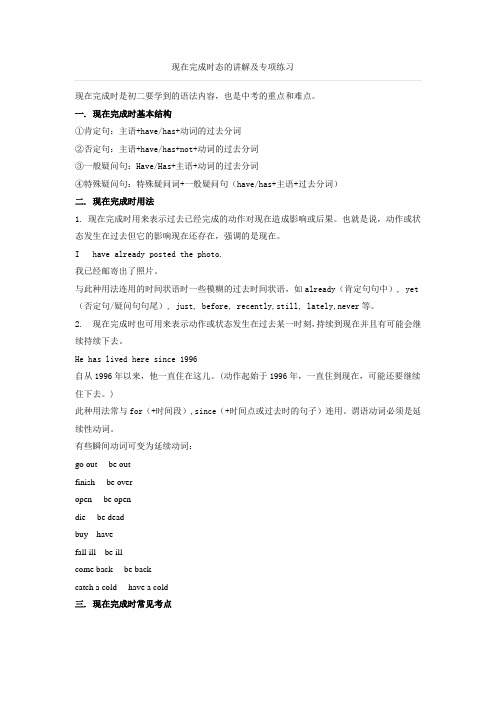
现在完成时态的讲解及专项练习现在完成时是初二要学到的语法内容,也是中考的重点和难点。
一. 现在完成时基本结构①肯定句:主语+have/has+动词的过去分词②否定句:主语+have/has+not+动词的过去分词③一般疑问句:Have/Has+主语+动词的过去分词④特殊疑问句:特殊疑问词+一般疑问句(have/has+主语+过去分词)二. 现在完成时用法1. 现在完成时用来表示过去已经完成的动作对现在造成影响或后果。
也就是说,动作或状态发生在过去但它的影响现在还存在,强调的是现在。
I have already posted the photo.我已经邮寄出了照片。
与此种用法连用的时间状语时一些模糊的过去时间状语,如already(肯定句句中), yet (否定句/疑问句句尾), just, before, recently,still, lately,never等。
2. 现在完成时也可用来表示动作或状态发生在过去某一时刻,持续到现在并且有可能会继续持续下去。
He has lived here since 1996自从1996年以来,他一直住在这儿。
(动作起始于1996年,一直住到现在,可能还要继续住下去。
)此种用法常与for(+时间段),since(+时间点或过去时的句子)连用。
谓语动词必须是延续性动词。
有些瞬间动词可变为延续动词:go out----be outfinish----be overopen----be opendie----be deadbuy---havefall ill---be illcome back----be backcatch a cold----have a cold三. 现在完成时常见考点对于现在完成时的考查,多以单选、句型转换或词语运用的形式考查学生在具体语境中灵活运用时态的能力。
在考试中,会让大家判断是否该用现在完成时,或者是考查“瞬间动词”不能与表示一段时间的状语连用”这一知识点。
- 1、下载文档前请自行甄别文档内容的完整性,平台不提供额外的编辑、内容补充、找答案等附加服务。
- 2、"仅部分预览"的文档,不可在线预览部分如存在完整性等问题,可反馈申请退款(可完整预览的文档不适用该条件!)。
- 3、如文档侵犯您的权益,请联系客服反馈,我们会尽快为您处理(人工客服工作时间:9:00-18:30)。
初中英语学习材料madeofjingetiejisince 和for 的用法(用于现在完成时)表示过去已经开始持续到现在的动作或状态常用的时间状语有:for, since, how long, so far, these days等。
1. since :a).since +时间点①年代②时刻数③一段时间+agob).现在完成时:主句(主语+have/has +延续性动词的过去分词)+ since +从句一般过去时c) It’s +时间段+since +短暂性动词的过去式d).时间段+has passed +since +短暂性动词的过去式for +一段时间练习:用since和for填空1) ______ two years 2) _______ two years ago 3) _______ last month4) ______ 1999 5) _______ yesterday 6) _______ 4 o’clock7) ______ 4 hours 8) _______ an hour ago 9) _______ we were children10) _____ lunch time 11) ______ she left here12). He has lived in Nanjing ________ the year before last.13). I’ve known him __________ we were children.14). Our teacher has studied Japanese _________ three years.15). She has been away from the city ___________ about ten years.16). It’s about ten years __________ she left the city.2. for: for +一段时间= since +一段时间+ ago3. 与时间段连用时,短暂性动词应改为相应的延续性动词。
1) come/go to ------ be at /in 2)leave ----be away from 3)buy ----have4) borrow /lend -----keep 4)open ---be open 5)close---be closed6) die---be dead 7) start/begin ----be on 8) join—--be in /be a member of /be a soldier9) become –be 10) fall asleep ---be asleep 11)catch a cold – have a cold12) have/has gone to → have been in 13) put on → wear14) finish/end → be over 15) marry → be married练习:.短暂性转换延续性1) His grandfather died two years ago .His grandfather has ____ ____ for two years._____two years _____ his grandfather ____.Two years ____ ____ ____ his grandfather _____.2) I became a teacher in 2000.I ________ __________ a teacher for _________ _________.3) The shop closed two hours ago.The shop ________ _________ _________ for _________ _________.4) The door opened at six in the morning.The door ________ ________ ________ for six hours.5)He left Fuzhou just now.He _______ ________ ________ _________ Fuzhou for five minutes.6)The film began two minutes ago.The film ____ ____ ____ for ____ ____.How time flies!7)They borrowed it last week.They _________ _________ it since __________ __________.8)I bought a pen two hours ago.I _________ _________ a pen for ________ __________.9)They married in 1990.They ________ _________ __________since _________.10)The meeting finished at six.The meeting ________ ______ ______ for six hours.11)My brother joined the army two years ago.My brother __________ __________ a ___________ for ___________ ___________.My brother ___________ ___________ in ____________ ___________ for two years.12)I put on my glasses three years ago.I __________ __________ my glasses for _________ _________.选择1. Three years ________since I ________ you last time.A. have passed; metB. has passed; metC. passed; have met2. He has been here _______ he left his hometown.A. sinceB. inC. for3. —He ________the English-Chinese dictionary for about twenty years,but it is still new.—What a careful man!A. has boughtB. has borrowedC. has had4. ---When did China _____ the WTO?---China _____ the WTO for several years.A. join; has been a member ofB. join; has joinedC. take part in; have been in5. How long have you _____ the book?A. boughtB. borrowedC. kept6. How time flies! Several years _______ since we started our middle school life. We will keep the pleasant experiences in our minds.A. have passedB. has passedC.will pass7. Mr Fan _____ this bike in 2005. He ______ it for 10 years.A.bought, has boughtB.has bought, has hadC. bought, has had8. He ___ in our school for 20 years and he ___ here in 1977.A. has taught; cameB. has taught; has comeC. taught; cameD. has teached; has came9.They are late. The film ___ for five minutes.A. has begunB. has startedC. has been onD. began10.We have been friends since _____.A. five yearsB.five years agoC. five years before11..He has lived there ___ 1992.A. sinceB. forC. after12.Mike _____ the bike for a month.A. has boughtB. has hadC. has borrowed13.He his home for ten yearsA. has leftB. left fromC. has been away from14.May ______ the book for two weeks.A. borrowedB. lentC. keptD. bought15.I _____ the job since 2002.A: have B: had C: have had16.He has been a student_____two years.A inB onC afterD forPage731.for +一段时间= since +一段时间+ ago (how long)★how long 与动词连用时必须使用延续性动词或表示状态的动词。
2.buy → haveI bought a pen two hours ago.=I _________ _________ a pen for ________ __________.=I ________ _________ a pen ______ _______ ______ ______.3.have a yard sale举行一个庭院拍卖会4.It’s hard to do sth.做某事很难5.more than = over超过,多于→ less than不到,少于6.memory ( n ) → memorize ( v ) 记忆7.keep old things保留旧东西8.give away捐赠9.in need( n)需要中的,困难中的★need 的用法:○1need可当情态动词,只用于疑问句或否定句中):Need I go now? (need 放在一般疑问句的开头)I needn’t tell you the answer. (否定句中直接在need后加not)【当情态动词时,need无时态变化。
